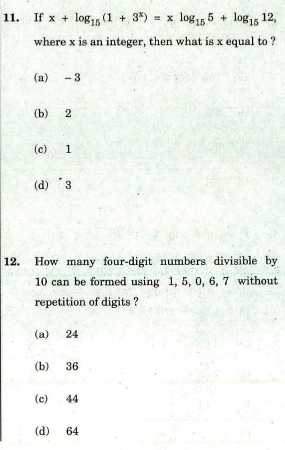
|
|

|
All Questions Topic List |
ArithmeticQuestion and Answers: Page 4 |
Question Number 206924 Answers: 2 Comments: 1
|

|
Question Number 206848 Answers: 1 Comments: 1
|

|
Question Number 206805 Answers: 2 Comments: 0
|

|
Question Number 206783 Answers: 1 Comments: 1
|

|
Question Number 206709 Answers: 3 Comments: 4
|
| Find the missing number
determinant ((( 72),(24),( 6)),(( 96),(16),(12)),((108),( ?),(18)))
A.12 B.16 C.18 D.20
Please help...
|
|
Question Number 206675 Answers: 1 Comments: 0
|
|
There are three positive integers a, b, and c such that
their average is 35 and a ≤ b ≤ c. If the median is
(a + 18), then find the minimum possible value of c.
(1) 41. (2) 42. (3) 39. (4) 40
|
There are three positive integers a, b, and c such that
their average is 35 and a ≤ b ≤ c. If the median is
(a + 18), then find the minimum possible value of c.
(1) 41. (2) 42. (3) 39. (4) 40
|
Question Number 206636 Answers: 0 Comments: 1
|
| resoudre dans N^2 l equation
2x^2 +3y^2 =35
|
|
Question Number 206608 Answers: 1 Comments: 0
|

|
Question Number 206399 Answers: 2 Comments: 1
|

|
Question Number 206353 Answers: 0 Comments: 6
|

|
Question Number 206309 Answers: 2 Comments: 0
|
| Find the ways to express 11025
as product of two factors.
(a) 13 (b) 14 (c) 26 (d) 27
|
|
Question Number 206253 Answers: 2 Comments: 0
|
|
f(x)= log_( 2) ( x + 2(√x) +4 )
⇒ f^( −1) ( 13 −4(√3) ) = ?
−−−−−
|
|
Question Number 206230 Answers: 1 Comments: 0
|
| Expand x^2 + 2x + 3 respect to x = −2.
(a) (x − 2)^2 −2(x + 2) + 3
(b) (x + 2)^2 −2(x + 2) + 3
(c) (x + 2)^2 + 2(x + 2) + 3
(d) (x − 2)^2 −2(x − 2) − 3
is it taylors theorem?
|
|
Question Number 206038 Answers: 2 Comments: 0
|
| (√(1 + 2023(√(1 + 2024(√(1+ 2025(√(1 + 2026(√(1 + ..............∞)))))))))) = ?
|
|
Question Number 205893 Answers: 0 Comments: 4
|

|
Question Number 205842 Answers: 2 Comments: 0
|
| ((32^(32^(32) ) )/9) ≡^R ?
|
|
Question Number 205794 Answers: 1 Comments: 1
|
|
A = { (k/2^n ) ∣ 1≤ k ≤ 2^n , n∈N }
find . A^( −) = ?
|
|
Question Number 205574 Answers: 1 Comments: 1
|
| S=(1/(2!))−(1/(3!))+(1/(4!))−(1/(5!))...
S=?
|
|
Question Number 205577 Answers: 1 Comments: 5
|
| is ∞ a real number?
|
|
Question Number 205502 Answers: 2 Comments: 0
|
| If two roots of ax^2 + bx + c = 0 are α and
β then (1/((aα^2 + c)^2 )) + (1/((aβ^2 + c)^2 )) = ?
|
|
Question Number 205457 Answers: 3 Comments: 0
|

|
Question Number 205456 Answers: 1 Comments: 0
|

|
Question Number 205350 Answers: 1 Comments: 2
|
| A man invested U24000.00 in U5.00
shares of a firm. After a period of
time, it appreciated to U5.50 per share.
How much dividend did he receive, if
the dividend declared is 50k per share?
|
|
Question Number 205175 Answers: 4 Comments: 0
|

|
Question Number 205117 Answers: 1 Comments: 0
|

|
Question Number 205032 Answers: 3 Comments: 1
|

|
Pg 1
Pg 2
Pg 3
Pg 4
Pg 5
Pg 6
Pg 7
Pg 8
Pg 9
Pg 10
|
Terms of Service |
Privacy Policy |
Contact: info@tinkutara.com |


























